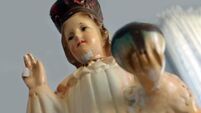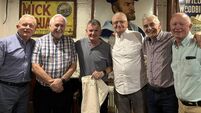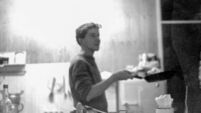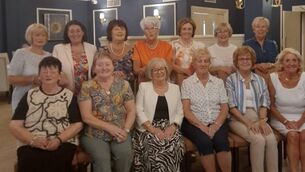Saluting Cork hurling legend Dinny, who died 50 years ago this week
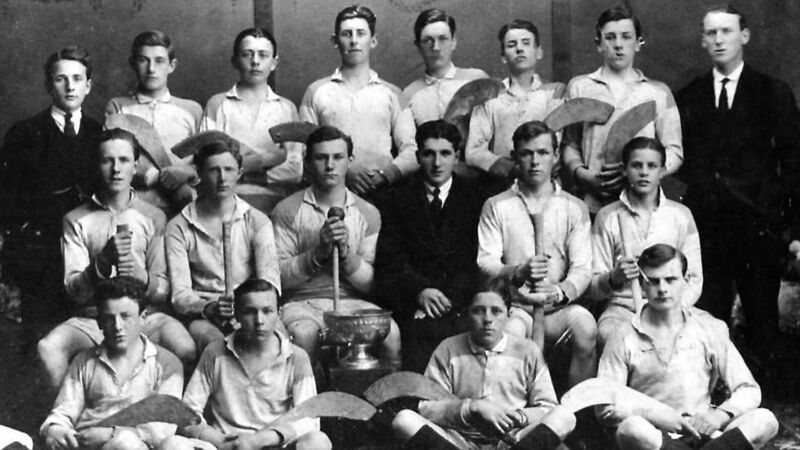
Dinny Barry Murphy (front row, third from left) on the 1918 Farranferris College Hurling team. Back: Pat Nyhan, John V O’Sullivan, Michael Roche, Paddy Flynn, Paddy Walsh, Charlie O’Donovan, Gus Coffey, John Canty. Middle: Joe Smith, John Carey, Willie Cotter (captain), John Cowhig, Pat Murphy, John Dineen. Front: Bob Kelly, D J Donovan, Dinny Barry Murphy, Batt Murphy
“Denis Barry Murphy came of a great Cork family - generations of them... ‘Dinny Barry Murphy boy! He’d take the ball out of your eye; and he wouldn’t hurt a fly’.” From the 1940 book Hurling, by P.D Mehigan (known as 'Carbery'),
IT is unfortunate that the absence of film, photographs or even adequate newspaper reports means the feats of many of the great sportsmen of the first half of the 20th century cannot be relived or viewed like sportsmen of more modern times.
This has been the fate of Dinny Barry Murphy, who died 50 years ago this week.
He was born in July, 1903, the fourth of five brothers, in the townland of Coolmakee, near the village of Cloughduv in Mid-Cork.
All the Barry Murphy clan hurled. John was first to gain fame when he lined out with Cork in the 1919 All-Ireland senior hurling final in the 6-4 to 2-4 defeat of Dublin.
While John was blazing a trail with Cork and Cloughduv, Dinny was a student at St Finbarr’s Farranferris, where he was developing his own reputation as a stylish hurler.
In 1918, aged just 14, he lined out with Farranferris in the first ever Munster Colleges (Harty Cup) championship. Christian Brothers College created a major shock when they beat them in the Southern Region final 6-1 to 4-2. The next year, 1919, Dinny won a Cork Colleges (O’Callaghan Cup) hurling championship medal with Farranferris.
There was little organised hurling in Cork between 1920-1923. During that time, Dinny became a student at UCC where he won a Fitzgibbon Cup medal in 1924/25.
He came of age as a hurler in 1926, making his senior champ-ionship debut for Cork against Waterford in the Munster quarter-final. Cork won easily, 12-3 to 5-2, then beat Kerry 7-4 to 1-4 in the semi-final.
The Munster final against Tipperary became a trilogy of games. The first drew a crowd of over 30,000 to the Athletic Grounds in Cork on September 19. That was well above capacity and spectators spilled onto the playing area, causing the game to be abandoned in the first-half.
The replay in Thurles a week later was described by Dinny as “the toughest game I ever played in”. The Cork Examiner said it was a “strenuous encounter” but added the “the referee had only to interfere once, and he then put off a player from each side.”
Tipperary recovered from an eight-point half-time deficit to earn a draw.
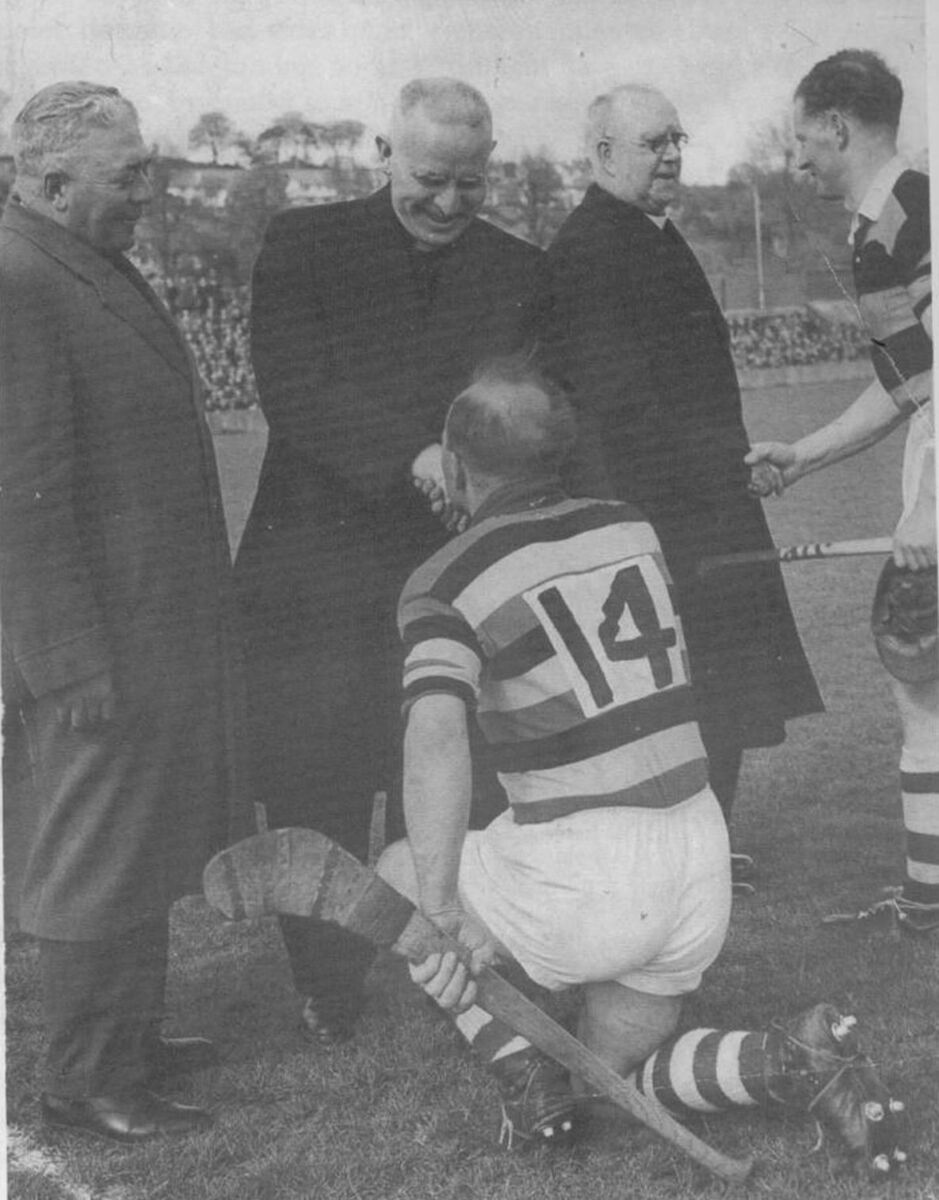
The second replay on October 3, although not as fierce, was another classic between the sides, Cork winning 3-6 to 2-4. They went on to win the All-Ireland, Dinny picking up the first of his four All-Ireland medals.
At the start of 1928, Cloughduv and neighbouring club Bride Valley joined together to form Eire Óg. The new team entered the county senior hurling championship and Dinny was made captain. That summer, Cork beat Clare in a replayed Munster final, and went on to beat Galway in the All-Ireland final.
Six weeks later, Dinny led Éire Óg to defeat Mallow in the County Final. That meant he was Cork captain for the 1929 season. The core of the team had by then been together for five years and was at its peak.
Tipperary and Waterford were beaten in Munster, and Cork beat Galway again in the All-Ireland final as Dinny accepted the Liam MacCarthy Cup.
On St Patrick’s Day, 1930, he completed a very successful run as captain when he led Munster to success over Leinster in the Railway Cup competition.
By then, Dinny was married to Mary Clancy and living in Cork city. He worked by day in the Farmers Union and the couple also ran the Three Ones pub in Barrack Street.
He had another busy year on the hurling field in 1931. Cork beat Waterford to win Munster and went on to face Kilkenny in the All-Ireland final. It took three games to decide the title - all thrillers - and Cork finally won 5-8 to 3-4. Eire Óg reached the county final too, but on this occasion they lost to Blackrock.
Cork’s hurling fortunes faded after that and in 1934 Dinny threw in his lot with St Finbarr’s. They were aiming for a third successive title but lost a famous final to Glen Rovers.
Around then, Mary and Dinny left the Three Ones to take over the Mail Coach (now the Old Oak) on Oliver Plunkett Street. He retired from hurling in 1936.
At Christmas, 1937, a chat with some of his old Cloughduv team-mates led to Dinny’s return to the hurling field. Cloughduv had broken up with Bride Valley and reformed as an independent club. They won the Mid-Cork junior championship in 1938, ’39 and ’40. In 1940, the club went on to win the county junior championship too. They won the intermediate county championship in 1941 and were promoted to the senior grade for 1942.
On May 3, 1942, Dinny Barry Murphy played his last hurling game as Cloughduv lost to Imokilly in the first round of the county senior championship. He was almost 39 years of age.
Even as the playing phase in his career was ending, another had begun - Dinny had become a selector on the Cork senior hurling team, a role he would fulfil most years until 1958.
He had been a hurler par excellence, undoubtedly one of Cork’s best ever, and brought the same knowledge to the back-room role. He was a selector with the four in-a-row teams of the 1940s and the three in-a-row teams of the 1950s.
Dinny continued to attend as many hurling games as he could. He died on Friday, August 17, 1973. His nephew, 19-year-old Jimmy Barry Murphy, attended the removal on the Saturday evening. Next day he travelled to Dublin and scored two goals as Cork beat Tyrone in the All-Ireland senior football semi-final.
The torch of greatness had passed on from one Barry Murphy generation to the next.
We might never be able to enjoy Dinny’s performances on the field, as we can still enjoy Jimmy’s through film. But we have the words of P.D Mehigan, to remind us, “Denis Barry Murphy came of a great Cork family - generations of them.”
